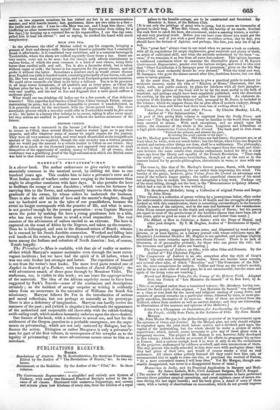MARRYAT'S PRIVATEER'S-MAN
Is a clever book. The author endeavours to give variety to materials essentially common to the nautical novel, by shifting the time to one hundred years ago. This enables hint to have a privateer's crew and a West Indian mode of warfare rather more verging to the buccaneers than might be altogether consistent with later days. It also permits the hero to facilitate the escape of some Jacobites ; which varies his fortunes by carrying him to the Tower, and subsequently improves them through the gratitude of his owner, by whose orders he undertook the business. There is also the old incident of love and the master's daughter, though not "so hacknied now as in the tales of our grandfathers, because the event'no longer corresponds with the practice of life, and what is more, is not genteel enough for the present generation : even Captain Marryat saves the point by making his hero a young gentleman heir to a title, who has run away from home to avoid a cruel stepmother. The rest consists of the adventures of sailors carried to an extreme. The hero is captured on the coast of Africa by the Negroes, and taken up the country. Then he is kidnapped, and sent to the diamond-mines of Brazil; whence he is rescued by his Jesuit Jacobite connexion. Wrecked and falling into evil hands oii his return, he goes through a variety of improbable adven- tures among the Indians and colonists of North America : but, of course, 11 ends happily.
The Privateer's-Man is readable, with that air of reality or matter- of-fact which Marryat's manner maintains even through the most extra- vagant incidents ; but we have had the spirit of it all before, when it was not only fresher but stronger and better. The repetition of himself is not from the writer's beat books. The more level parts remind one of Japhet in Search of a Father, with touches of Jacob Faithful; the wild adventures smack of those gone through by Monsieur Violet. The craftsman, too, is visible in this work; we can trace the appropriation of the materials. The idea of the African captivity seems to have been suggested by Park's Travels—some of the sentiments and descriptions certainly ; as the incident of savage surprise at writing is evidently taken from an occurrence in the narrative of Williams the South Sea Missionary. Marryat follows De Foe in the introduction of serious and moral reflections, but not perhaps so naturally as his prototype. There is also a deficiency of imagination. Marryat can hardly revive the manners of the past ; and (which is singular) he confounds the appearance of the authorized and respectable old slave-ship with the rakish-looking swift-sailing craft, which modern humanity enforces upon the slave-dealers.
One feature of the book, with a reference to actual use, and but for the settlement of the Oregon question to a probable emergency, are the argu- ments on privattering, which are not only enforced by dialogue, but in- fluence the action. Ellington or rather Musgrave is only a privateer's- man for part of the first volume, in consequence of his scruples as to the legality of privateering: the more adventurous scenes occur to him as a merchant.


























 Previous page
Previous page